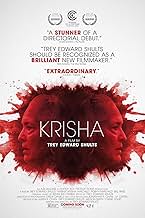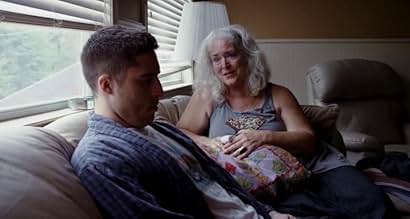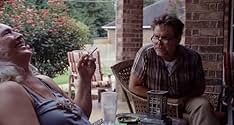Krisha returns for Thanksgiving dinner after ten years away from her family, but past demons threaten to ruin the festivities.Krisha returns for Thanksgiving dinner after ten years away from her family, but past demons threaten to ruin the festivities.Krisha returns for Thanksgiving dinner after ten years away from her family, but past demons threaten to ruin the festivities.
- Awards
- 17 wins & 28 nominations total
- Director
- Writer
- All cast & crew
- Production, box office & more at IMDbPro
Featured reviews
The unpleasant dynamics and tensions that many families navigate during the holidays can sometimes be downright horrifying. "Krisha," the story of a woman reunited with her family after she estranged herself many years ago in order to face her demons, is a stark reminder of how traumatic confronting the past can be.
Starring his aunt (Krisha Fairchild) and featuring himself and many of his family members, filmmaker Trey Edward Shults has gone extremely personal for his debut feature (based off a short of the same name). The film has a documentary-like feel at times and the family dynamics that play out on screen seem unusually authentic and genuine. Yet underneath it all, Shults works with camera technique and a non-traditional score to remind us how unsettling and difficult this is for his title character.
"Krisha," the film and the character, slowly becomes unhinged over the course of the film. Shults' script smartly denies us the amount of background information we'd like to have; we don't need to know exactly what she's done or what her problems were to be able to observe how frazzled this environment makes her and how confronting these long- ignored but deep-rooted relationships could dismantle her mentally and emotionally.
Shults begins and ends his film with close-ups of Krisha's face giving an indiscernible expression, perhaps with the goal of empathy. Normally we would empathize with the "normal" family members and in many ways we still do, but Shults stays close to Krisha in nearly every moment of the film and gives us piercing access to who she is. Fairchild rises up to meet the challenges that level of intimacy places on an actor. We see Krisha's discomfort and pain, and the sadness when her desire to make things right hits the roadblock of the pain she caused others in the past.
When tension does turn over to drama, the way it plays out feels impressively true to life. Shults clearly plays loose with his script, allowing these unseasoned actors to draw on their own experiences (and perhaps some actual family dynamics) and improvise dialogue. Even if you haven't had a family member melt down in front of everyone, there's a raw truth to the way tense scenes between people play out. That authenticity only makes "Krisha" all the more haunting.
Shults' direction and editing, however, is really the star of this film. He has strong instincts in terms of suspense, creating that slow build and unhinging of his film in the most simple of ways. Even in the most mundane of scenes, he draws forward any tension lurking beneath the surface. He also allows us to see, hear and experience things as the overmedicated mind of Krisha does, yet the techniques are not heavy-handed. He even plays with the chronology of events, weaving together scenes to focus on the emotional arc of the story as it pertains to Krisha rather than feeling beholden to how everything builds up in real time. The result is a much stronger portrait of Krisha and what's truly happening at a deeper level.
Filmmakers that can wield tension and suspense in this way have the skills to tell just about any story well, which bodes well for Shults' career. If he can turn the story of a troubled woman relapsing at Thanksgiving into what you might argue is a horror film that at times verges on Darren Aronofsky's "Requiem for a Dream," the sky's the limit.
~Steven C
Thanks for reading! Visit Movie Muse Reviews for more
Starring his aunt (Krisha Fairchild) and featuring himself and many of his family members, filmmaker Trey Edward Shults has gone extremely personal for his debut feature (based off a short of the same name). The film has a documentary-like feel at times and the family dynamics that play out on screen seem unusually authentic and genuine. Yet underneath it all, Shults works with camera technique and a non-traditional score to remind us how unsettling and difficult this is for his title character.
"Krisha," the film and the character, slowly becomes unhinged over the course of the film. Shults' script smartly denies us the amount of background information we'd like to have; we don't need to know exactly what she's done or what her problems were to be able to observe how frazzled this environment makes her and how confronting these long- ignored but deep-rooted relationships could dismantle her mentally and emotionally.
Shults begins and ends his film with close-ups of Krisha's face giving an indiscernible expression, perhaps with the goal of empathy. Normally we would empathize with the "normal" family members and in many ways we still do, but Shults stays close to Krisha in nearly every moment of the film and gives us piercing access to who she is. Fairchild rises up to meet the challenges that level of intimacy places on an actor. We see Krisha's discomfort and pain, and the sadness when her desire to make things right hits the roadblock of the pain she caused others in the past.
When tension does turn over to drama, the way it plays out feels impressively true to life. Shults clearly plays loose with his script, allowing these unseasoned actors to draw on their own experiences (and perhaps some actual family dynamics) and improvise dialogue. Even if you haven't had a family member melt down in front of everyone, there's a raw truth to the way tense scenes between people play out. That authenticity only makes "Krisha" all the more haunting.
Shults' direction and editing, however, is really the star of this film. He has strong instincts in terms of suspense, creating that slow build and unhinging of his film in the most simple of ways. Even in the most mundane of scenes, he draws forward any tension lurking beneath the surface. He also allows us to see, hear and experience things as the overmedicated mind of Krisha does, yet the techniques are not heavy-handed. He even plays with the chronology of events, weaving together scenes to focus on the emotional arc of the story as it pertains to Krisha rather than feeling beholden to how everything builds up in real time. The result is a much stronger portrait of Krisha and what's truly happening at a deeper level.
Filmmakers that can wield tension and suspense in this way have the skills to tell just about any story well, which bodes well for Shults' career. If he can turn the story of a troubled woman relapsing at Thanksgiving into what you might argue is a horror film that at times verges on Darren Aronofsky's "Requiem for a Dream," the sky's the limit.
~Steven C
Thanks for reading! Visit Movie Muse Reviews for more
Don't let the plot synopsis fool you. First-time writer-director Trey Edward Shults has managed to craft a unique and absorbing family drama from a premise which appears mundane and conventional on the surface.
Krisha Fairchild is magnificent in the lead role, and the mostly non-actor cast add a heightened sense of honesty and realism to the drama, which can make for engrossing, if at times uncomfortable viewing.
However, what makes Krisha truly stand out is the cinematography and score. With an opening shot lasting about six minutes, it's clear from the start that this isn't your run-of-the-mill family drama. The camera is used in ways that can sometimes call attention to itself, but is always in service of the story. The rattling score permeates the film with a feeling of dread and anxiety which, with the camera-work, really makes us feel what the title character is feeling.
While Krisha is not a perfect film (although the opening 20-30 minutes come close), it manages to feel unique and original in ways I didn't think would be possible in 2016. This is the most pleasant surprise of the year, and I can't wait to see what Shults does next.
Krisha Fairchild is magnificent in the lead role, and the mostly non-actor cast add a heightened sense of honesty and realism to the drama, which can make for engrossing, if at times uncomfortable viewing.
However, what makes Krisha truly stand out is the cinematography and score. With an opening shot lasting about six minutes, it's clear from the start that this isn't your run-of-the-mill family drama. The camera is used in ways that can sometimes call attention to itself, but is always in service of the story. The rattling score permeates the film with a feeling of dread and anxiety which, with the camera-work, really makes us feel what the title character is feeling.
While Krisha is not a perfect film (although the opening 20-30 minutes come close), it manages to feel unique and original in ways I didn't think would be possible in 2016. This is the most pleasant surprise of the year, and I can't wait to see what Shults does next.
For reasons never made entirely evident, 60-something Krisha has willfully severed ties for several years with her family, including a now young adult son. She decides to reconnect with her kin for Thanksgiving dinner at the suburban home of her sister and her family.
I grew up in a suburban Texas community not unlike the one which serves as the setting for the entirety of "Krisha". As such, I can almost literally sense the air, smell the scents and feel the sensibility of the space these characters inhabit. I have lived it. The memories for me are lasting. And they are abundantly good. Not so in this mostly morose and melancholy scenario.
Veteran but still little-known actress Krisha Fairchild ("The Killing of John Lennon" representing one of a handful of somewhat recognizable credits) delivers remarkable and wrenching work here. Fairchild is exceptionally effecting as she gives us a deeply troubled profile of an irrevocably tortured soul riddled with substance abuse, self loathing, uncontrollable anger and crippling regret.
This is a mysterious woman to be sure. Where exactly has Krisha been for all of these years in estrangement? What is it that has occupied her life during this time of indistinct purpose? Krisha reveals only vague hints and innuendo to various members of an uncomfortably skeptical family. Observing the holiday festivities and camaraderie carry on all about her, she remains remote, detached, never engaging in any of it, focusing instead almost exclusively and at her own insistence on preparing the super-sized turkey for that evening's meal.
The very characteristics that make Fairchild's portrayal so riveting are the same traits that make this excruciatingly conflicted character so dreadfully off-putting. Because we do not come to know practically anything at all about why Krisha ever abandoned her family in the first place, we never have a frame of reference for why she would ever even choose to do this. This confounding ambiguity leaves us feeling as distant from Krisha as she is from her own flesh and blood relatives. How can we genuinely invest in and grow to care for a person about whom we know virtually nothing and who has given us no compelling reason to do so? We feel very sorry for Krisha, sure. But beyond that we are inspired to generate little if any emotion beyond pure pity.
Technically, much of the key speech in "Krisha" was extremely difficult to make out, either as a result of it being overly hushed or garbled as characters talked over and above each other. I by and large appreciate natural dialogue as it is spoken in "real life" in most films, a dynamic that first time feature Writer and Director Trey Edward Shults was clearly striving for in his project. But when it is impossible to decipher what is being said, even after rewinding and replaying these scenes as I was able to do, the overall effect which you are efforting to achieve is unfortunately, and frustratingly, lost in translation. Moments involving Krisha and her wheelchair-bound mentally fragile mother, and what should have been a memorably moving interchange between Krisha and her long-suffering sister toward the end of the picture, are two especially conspicuous examples of these audio recording shortcomings really hurting the overall impact of the story.
Shults's choice to employ a constant instrumental undercurrent of enormously edgy electronica for the first several minutes of "Krisha" certainly serves it's purpose of establishing an atmosphere of palpably building tension. But soon the moody music devolves into an overdone distraction, eventually becoming simply an ill-advised artistic affectation.
This is criticism reasonably forgivable for a rookie from a personal perspective. But ideally they are lasting lessons learned in what, even with these missteps, looks to be a considerably capable career.
This is a depressing movie. Unrelentingly so. And I know from depressing flicks, having seen my share of them over the years. However, there aren't many among this gloomy group that I would rank above "Krisha".
In the end, nothing is clarified and nothing is resolved in "Krisha". Consequently, as an audience we are left with no appreciable degree of either resonance nor redemption. Only a sad and sour familial holiday experience. And, though granted generally not this extent, haven't we all in our own lives had our fill of at least some manner of domestic dysfunction? Watching somebody else's tumult and torture and classifying it as worse than one's own is not exactly a superlative barometer for satisfying cinematic consumption.
I'm giving "Krisha" a charitable 6 out of 10, almost entirely, and quite candidly, because the film was shot in The Lone Star State and out of high regard for Fairchild's arresting performance.
I grew up in a suburban Texas community not unlike the one which serves as the setting for the entirety of "Krisha". As such, I can almost literally sense the air, smell the scents and feel the sensibility of the space these characters inhabit. I have lived it. The memories for me are lasting. And they are abundantly good. Not so in this mostly morose and melancholy scenario.
Veteran but still little-known actress Krisha Fairchild ("The Killing of John Lennon" representing one of a handful of somewhat recognizable credits) delivers remarkable and wrenching work here. Fairchild is exceptionally effecting as she gives us a deeply troubled profile of an irrevocably tortured soul riddled with substance abuse, self loathing, uncontrollable anger and crippling regret.
This is a mysterious woman to be sure. Where exactly has Krisha been for all of these years in estrangement? What is it that has occupied her life during this time of indistinct purpose? Krisha reveals only vague hints and innuendo to various members of an uncomfortably skeptical family. Observing the holiday festivities and camaraderie carry on all about her, she remains remote, detached, never engaging in any of it, focusing instead almost exclusively and at her own insistence on preparing the super-sized turkey for that evening's meal.
The very characteristics that make Fairchild's portrayal so riveting are the same traits that make this excruciatingly conflicted character so dreadfully off-putting. Because we do not come to know practically anything at all about why Krisha ever abandoned her family in the first place, we never have a frame of reference for why she would ever even choose to do this. This confounding ambiguity leaves us feeling as distant from Krisha as she is from her own flesh and blood relatives. How can we genuinely invest in and grow to care for a person about whom we know virtually nothing and who has given us no compelling reason to do so? We feel very sorry for Krisha, sure. But beyond that we are inspired to generate little if any emotion beyond pure pity.
Technically, much of the key speech in "Krisha" was extremely difficult to make out, either as a result of it being overly hushed or garbled as characters talked over and above each other. I by and large appreciate natural dialogue as it is spoken in "real life" in most films, a dynamic that first time feature Writer and Director Trey Edward Shults was clearly striving for in his project. But when it is impossible to decipher what is being said, even after rewinding and replaying these scenes as I was able to do, the overall effect which you are efforting to achieve is unfortunately, and frustratingly, lost in translation. Moments involving Krisha and her wheelchair-bound mentally fragile mother, and what should have been a memorably moving interchange between Krisha and her long-suffering sister toward the end of the picture, are two especially conspicuous examples of these audio recording shortcomings really hurting the overall impact of the story.
Shults's choice to employ a constant instrumental undercurrent of enormously edgy electronica for the first several minutes of "Krisha" certainly serves it's purpose of establishing an atmosphere of palpably building tension. But soon the moody music devolves into an overdone distraction, eventually becoming simply an ill-advised artistic affectation.
This is criticism reasonably forgivable for a rookie from a personal perspective. But ideally they are lasting lessons learned in what, even with these missteps, looks to be a considerably capable career.
This is a depressing movie. Unrelentingly so. And I know from depressing flicks, having seen my share of them over the years. However, there aren't many among this gloomy group that I would rank above "Krisha".
In the end, nothing is clarified and nothing is resolved in "Krisha". Consequently, as an audience we are left with no appreciable degree of either resonance nor redemption. Only a sad and sour familial holiday experience. And, though granted generally not this extent, haven't we all in our own lives had our fill of at least some manner of domestic dysfunction? Watching somebody else's tumult and torture and classifying it as worse than one's own is not exactly a superlative barometer for satisfying cinematic consumption.
I'm giving "Krisha" a charitable 6 out of 10, almost entirely, and quite candidly, because the film was shot in The Lone Star State and out of high regard for Fairchild's arresting performance.
As an aspiring filmmaker, I cannot help but feel as if I relate to the debut filmmaker Trey Edward Shults. This film is heavily stylized and intense, and I feel that if I were able to make my own low budget film it would turn out to be something like this. The film focuses on extreme emotions, making the audience feel somewhat warm and humored at first, but completely crushed by the final shot. The film is overall extremely ambitious in its approach, due to Shults' use of long takes, black humor, and an atmosphere that contains both heavy realism and surrealism. "Krisha", one of the finest and funniest films to come out last year, is not only a beautifully made film but also the most earth shatteringly heartbreaking portrait of addiction since "Requiem for a Dream". It takes place during Thanksgiving as a family prepares for the holiday. One somewhat special member of the family has visited this year, Krisha, an old woman who has been absent of their presence for 10 years. This brilliant, harrowing shocker combines elements of humor and horror to craft a modern miracle. Unfortunately, this masterpiece is quite obscure and underrated-but I must urge anyone stumbling across my review to check it out immediately! It is a jaw droppingly fantastic work of art.
The first shot of "Krisha" is a slow zoom into the titular characters face, with ominous, rising music in the background. The preceding scenes (and the fantastic introductory long take) show that Krisha is coming home to family that she hasn't seen in a while on Thanksgiving day, and has good intentions for her visit. But this mood of uncertainty established in the opening shot rises throughout the movie. Even though Krisha is simply participating in usual small talk towards the beginning of the film, the unpredictable soundtrack, frantic movement of the camera, and the performances of the characters suggest Krisha isn't stable.
The film is very subtle and deliberate in what it reveals to us about this family and Krisha's past. The film starts after much has already happened with her character, and many things are revealed about her throughout the film, but most are just suggested. She has problems in her past that have affected her whole family, and her sudden visit to them intends to make up for those problems.
The camera and aspect ratios tell us a lot about the state of Krisha's character. At first the camera movements are frantic but fluid, showing Krisha is in control, but could lose it at any moment. Then the camera is shaky and the aspect ratio narrows, with two black bars at the top and bottom, showing Krisha is on the verge of breaking, relapsing into alcoholism. Then the aspect ratio boxes her in and the editing and camera movements are spastic, showing her isolation and inability to escape it.
While the cinematography tells a lot about Krisha, the actress portraying her, Krisha Fairchild, really tells the most. Her repressed suffering is evident with this actress. This is the type of film where all of the actors make each scene feel natural and incredibly realistic. They seem like real people in a family we could know, and that's part of what makes the film so brutal.
Krisha is a devastating, deeply emotional character study and one of the best films of 2016.
The film is very subtle and deliberate in what it reveals to us about this family and Krisha's past. The film starts after much has already happened with her character, and many things are revealed about her throughout the film, but most are just suggested. She has problems in her past that have affected her whole family, and her sudden visit to them intends to make up for those problems.
The camera and aspect ratios tell us a lot about the state of Krisha's character. At first the camera movements are frantic but fluid, showing Krisha is in control, but could lose it at any moment. Then the camera is shaky and the aspect ratio narrows, with two black bars at the top and bottom, showing Krisha is on the verge of breaking, relapsing into alcoholism. Then the aspect ratio boxes her in and the editing and camera movements are spastic, showing her isolation and inability to escape it.
While the cinematography tells a lot about Krisha, the actress portraying her, Krisha Fairchild, really tells the most. Her repressed suffering is evident with this actress. This is the type of film where all of the actors make each scene feel natural and incredibly realistic. They seem like real people in a family we could know, and that's part of what makes the film so brutal.
Krisha is a devastating, deeply emotional character study and one of the best films of 2016.
Did you know
- TriviaBillie Fairchild, who plays Grandma in the film, is actually suffering from Alzheimer's Disease, so she was not entirely aware she was acting in a film, although director Trey Edward Shults said she had a wonderful time at the "Thanksgiving."
- ConnectionsFeatured in Human Nature: Creating It Comes at Night (2017)
- SoundtracksJust in Time
Written by Betty Comden, Adolph Green, Jule Styne
Courtesy of Warner Chappell Inc o/b/o Stratford Music Corp.
Performed by Nina Simone
Courtesy of the Estate of Nina Simone and Rich & Famous Records, Ltd.
© 1968, courtesy of Steven Ames Brown
- How long is Krisha?Powered by Alexa
Details
Box office
- Gross US & Canada
- $144,822
- Opening weekend US & Canada
- $9,880
- Mar 20, 2016
- Gross worldwide
- $144,822
- Runtime1 hour 23 minutes
- Color
- Sound mix
- Aspect ratio
- 1.85 : 1
Contribute to this page
Suggest an edit or add missing content

































